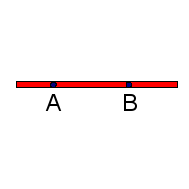Line (Euclidean geometry)
Jump to navigation
Jump to search
A line is a concept in Euclidean geometry that has length but no breadth or depth. A line is made up of an infinite number of points. Lines in Euclidean geometry are by definition straight lines, meaning that they define the shortest route between two points on the line. Curved lines are called curves.
Lines are often designated by referring to two points that lie along the line. Thus the line on which the point A and the point B are found is called AB. Lines are also referred to by mentioning a number of points that they pass through, thus the line ABC is the line on which the point A, point B, and point C are found.
The following demonstrates a line:
Given a line AC Point B is on AC ABC is the same line AC
